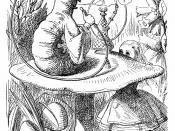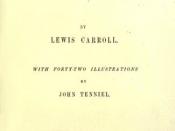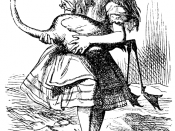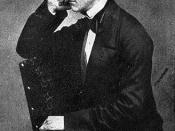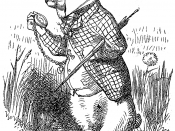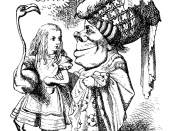Many people these days do not have enough experience to be called mature. The great Fritz Kunkel, a German physician and author of 12 books, once said: "To be mature means to face, and not evade, every fresh crisis that comes." It seems as if teenagers simply avoid quandaries and try to take the path of least resistance. Such people do not endure enough moral dilemmas to figure out how to combat evils and ultimately become mature. Lewis Carroll'sAlice's Adventures in Wonderland shows how exposing children to moral wrongdoings can help them become responsible and mature people at an early age.
Alice displays a remarkable amount of wit and maturity because of the moral wrongdoings of a group of evil creatures. Alice goes into the rabbit's house and drinks a liquid that makes her really big. She gets so big that she can not get out of the house.
Creatures from outside then throw pebbles at her through the window, and some of them hit her in the face. Alice then realizes that "the pebbles were all turning into little cakes as they lay on the floor" (49 Carroll). Alice gets a great idea from this. She hypothesizes that eating the cake will reduce her size, as it did to her before in the story. Alice eats the cake and then shrinks and escapes out of the house, away from the creatures. The creatures throw things at Alice, when they really should help her. They display immoral characteristics. Alice is put in a situation where moral wrongdoings took place, so she formulates a shrewd plan and displays a high level of maturity. Literary critic Lillian Smith believes that "Alice, as the most reasonable creature in her unreasonable dreams, does not quite yet realize that the adult's sense of reality has already taken up residence in her" (Smith 31). No seven year old could ever come up with a clever ruse as Alice had. Only a reasonable mature adult with intelligence could do what Alice illustrates. She observes her surroundings, sees what she needs, uses information that she learned from the past and devises a plan in which she is successful in executing. Alice does not realize her adulthood, but her actions and thoughts clearly show that more of an adult residence is in her. All in all, Alice is more of an adult because of how she handled the situation in the house.
The main character of this story makes a responsible decision when she enters into the kitchen, which occurs because of the moral dilemma she faces. Alice walks into the kitchen and sees that the cook is throwing things at the Duchess and the baby. Alice intelligently thinks to herself, "If I don't take this child away with me, they're sure to kill it in a day or two. Wouldn't it be murder to leave it behind?" (72 Carroll). If it was not for a situation such as this, where the cook disregards the health of the baby and let his anger loose uncontrollably, Alice would have never made that responsible decision to save the baby. Alice displays her high level of maturity because of the cook's reckless anger. Literary critic Tan Lin believes that "What Alice the child already knows, the adult has yet to learn" (Lin, xii). In the case with Alice, the cook and the Duchess, this applies very thoroughly. The Duchess ignores the potential danger of the cook's utilities being thrown at the baby. Alice realizes this, but the Duchess does not. The cook disregards the baby and continues his temper tantrum, but Alice realizes the baby's presence and decides to take it to safety. Alice knows things, which the adults do not even know, and this ultimately shows her maturity level. Therefore, the problem that Alice encounters in the kitchen allowed her to become a responsible person.
Alice presents a great deal of aptitude during a session in a court, because of the dishonesty that the king shows. During a trial in the court room, the king makes up an outrageous law that is concocted so that Alice gets kicked out of the courtroom. The king says: "Rule Forty-two. All persons more than a mile high to leave the court" (137 Carroll). The king also mentions that this is the oldest rule in the book. Alice cleverly replies: "I'm not a mile high. That is not a regular rule: you invented it just now. It ought to be Number One" (137 Carroll). The king did not think that Alice is this clever. Alice replies that the rule does not apply to her, because she is not a mile tall at all. In addition, Alice explains that if the rule is the oldest rule, then it would be the first rule, not the forty-second rule. She not only disagrees with the all mighty king, but she explains why she disagrees and proves the king's statement to be fallacious. Alice is an adult at heart. Literary Critic Edward Salmon believes that "Alice is wiser than any lesson books are able to teach her to be" (Salmon 42). This is true, because many children at the age of seven years old do not go beyond the textbook. They just read and stay within the terms of context. Children do not analyze their surroundings the way Alice does. No textbook can teach a person to handle a situation as Alice did in the court room. Only a level of maturity can allow a person to do this. In conclusion, the predicament that Alice faces in the court room allows her to become a more prudent person.
Lewis Carroll'sAlice's Adventures in Wonderland demonstrates how the exposure of children to moral misconduct aid children in gaining maturity at an early age. Though these situations seem odd, upon examining closely, one can see that they are often related to very realistic situations. These are situations where children of Alice's age would most likely consult another adult. On the contrary, Alice actually makes several independent and well thought-out decisions. She is setting an example for the youth of today and showing that they should learn right from wrong and start making decisions.
